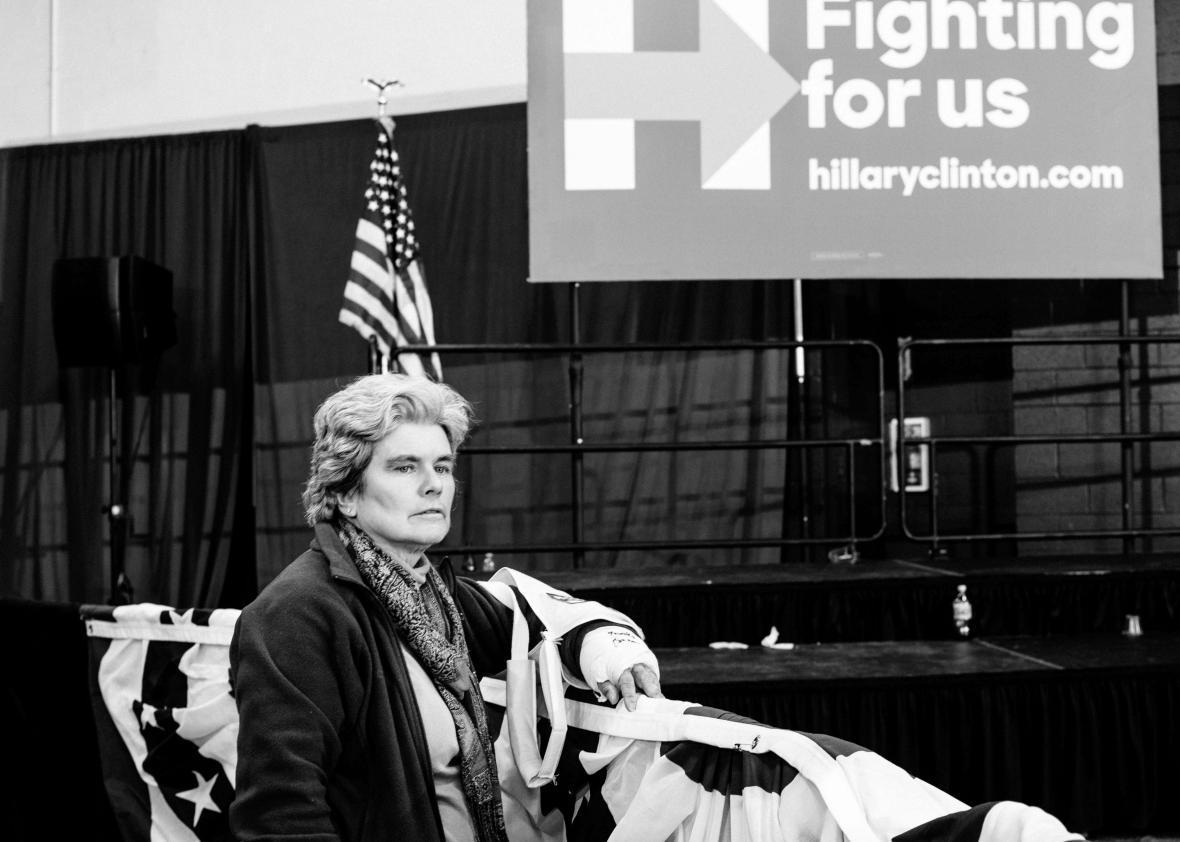MANCHESTER, NEW HAMPSHIRE—Even if you’re favored, even if you’re in good shape for the long haul, losing hurts. It feels awful—like there’s more to come, and more to endure.
That was the mood at Hillary Clinton’s primary night “party” at Southern New Hampshire University on Tuesday, where a modest crowd of supporters gathered in the school’s athletic complex to celebrate Clinton, even as she fell far short of Bernie Sanders in the state’s primary. Clinton’s supporters, who barely filled the room, cheered for the former secretary of state, her husband, and her daughter. But the excitement you see with a winning, confident campaign just wasn’t there. What was there, on the other hand, was a kind of resolve, and a kind of hope.
“You know, I’ve been supporting Hillary for a long time—eight years ago, I was with her,” said Mary Jane, an older woman from the area. “And I know Hillary, and it’s like she says. She’s been knocked down, but she’ll get up, and she’ll keep fighting, and that’s the way I feel too.” Another supporter, Connie, wasn’t from New Hampshire—she flew down from Alaska to canvass for Clinton—but she was also sure Clinton would prevail. “I think she’s got the smarts, she’s got the strength, she’s got the experience, and she’s who we need,” she said.
As for Bernie? “He reminds me of when I was in college, from ’69 to ’72, and idealistic. I don’t think Bernie ever lost that. But I think most of us have gone through life and figured out that we have to make lots of compromises and we have to find practical solutions.”
This was the refrain from all the women I spoke to. Yes, Clinton took a knock. A hard one. But she would return to the ring and win, because she was the most qualified and most competent candidate in the race. The problem is that, for a critical number of Democrats—both in New Hampshire and throughout the country—this isn’t what counts, or at least, it’s not enough. They want Bernie’s idealism, his integrity, and his urgency.
For them, Clinton’s experience doesn’t make up for her incrementalism, her occasional eagerness for compromise, and her willingness to go with the political winds if that’s what it takes to survive the storm. To these voters, she’s an irreducibly flawed vessel for the party.
Clinton, for her part, is doing what she can to speak to the distrust among younger voters. Not by condemning or condescending but by acknowledging her weakness and pledging to move forward. “I know I have some work to do, particularly with young people,” she said to an audience both disappointed in the results and thrilled to be in her presence. “But I will repeat again what I have said this week: Even if they are not supporting me now, I support them. Because I know I’ve had a blessed life, but I also know what it’s like to stumble and fall. And so many people across America know that feeling. And we’ve learned that it’s not whether you get knocked down that matters, it’s whether you get back up.”
Tuesday’s defeat was grim, but it is important to remember that Iowa and New Hampshire are not the Democratic Party. In particlar, the voters who backed Sanders are younger, whiter, and far more liberal than the typical Democrat. From now forward, the question of the Democratic primary is whether this cohort is a harbinger of a shift in the Democratic Party writ large, or if it’s sui generis, the product of attitudes, experiences, and expectations that aren’t shared among the rest of the party’s voters.
There are signs the latter is true. According to a January poll from ABC News and the Washington Post, 62 percent of nonwhite Democrats and 58 percent of Democrats over 50 say that Hillary Clinton would be most likely to bring change to Washington, D.C., and the nation at large. And this is important: In the next two contests—Nevada and South Carolina—black and Latino Democrats will hold huge sway over the outcomes.
New Hampshire, in other words, is just the beginning. Sanders is a formidable candidate, but he has a new, even larger challenge than winning in the opening states of the Democratic primary. He has to expand his message to potentially skeptical groups with concerns that aren’t always tied to economic inequality. And as for Hillary Clinton? She and her campaign are prepared for a long, hard slog. “Here’s what we’re going to do,” she said to her supporters, “We’re going to take this campaign to the entire country. We’re going to fight for every vote, in every state. We’re going to fight for real solutions that make a real difference in people’s lives.”
It’s a subtle dig at Sanders—one based in her claim that she’s a “progressive who gets things done.” It landed with the crowd. But Clinton needs more than her crowd to win the nomination.
